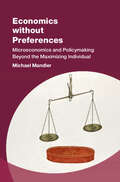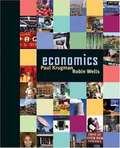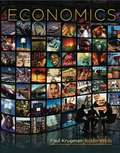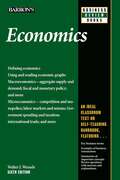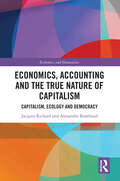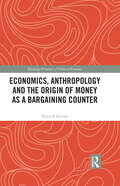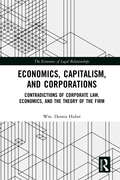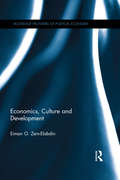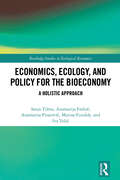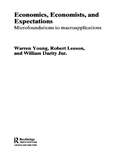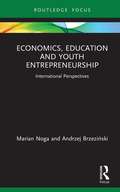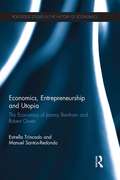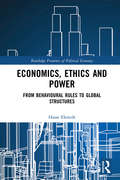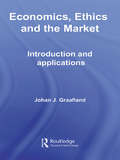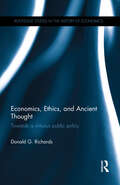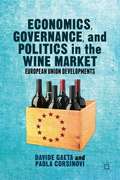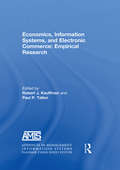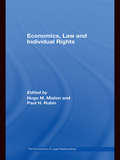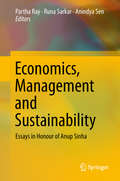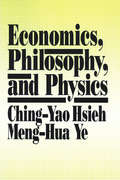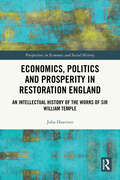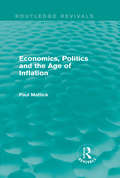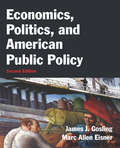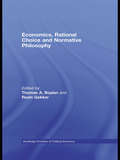- Table View
- List View
Economics without Preferences: Microeconomics and Policymaking Beyond the Maximizing Individual (Studies in New Economic Thinking)
by Michael MandlerEconomics without Preferences lays out a new microeconomics – a theory of choice behavior, markets, and welfare – for agents who lack the preferences and marginal judgments that economics normally relies on. Agents without preferences defy the rules of the traditional model of rational choice but they can still systematically pursue their interests. The theory that results resolves several puzzles in economics. Status quo bias and other anomalies of behavioral economics shield agents from harm; they are expressions rather than violations of rationality. Parts of economic orthodoxy go out the window. Agents will fail to make the fine-grained trade-offs ingrained in conventional economics, leading market prices to be volatile and cost-benefit analysis to break down. This book provides policy alternatives to fill this void. Governments can spur innovation, the main benefit markets can deliver, while sheltering agents from the upheavals that accompany economic change.
Economics, 1st Edition
by Paul Krugman Robin WellsKrugman/Wells takes a story-driven approach that focuses on real-world economics at work. The book offers the hallmark clarity and engaging writing style that distinguish Paul Krugman's work, from his best-selling international economics text to his "New York Times" best-sellers.
Economics, 2nd Edition
by Paul Krugman Robin WellsThe same unique voice that made Paul Krugman a widely read economist is evident on every page of Economics. The product of the partnership of coauthors Krugman and Robin Wells, the book returns in a new edition. The new edition is informed and informative, solidly grounded in economic fundamentals yet focused on the realities of today's world and the lives of students. It maintains the signature Krugman/Wells story-driven approach while incorporating organizational changes, new content and features, and new media and supplements. Watch a video interview of Paul Krugman here.
Economics, 6th edition (Barron's Business Review Series)
by Walter J. WesselsA thoughtful and comprehensive guide to Economics with crystal-clear summaries and explanationsBooks in this series are designed for classroom use, summarizing key concepts and presenting review questions with answers and explanations. This new edition:Defines economicsDemonstrates the uses of graphsDiscusses the law of supply and demand Covers macroeconomics topics including national output, inflation, unemployment, aggregate demand and supply, the Keynesian model, monetary policy, and moreCovers microeconomics topics including monopolies, forces that promote competition, game theory, labor markets and unions, government spending and taxation, and more.
Economics, Accounting and the True Nature of Capitalism: Capitalism, Ecology and Democracy (Economics and Humanities)
by Jacques Richard Alexandre RambaudAlmost all economists, whether classical, neoclassical or Marxist, have failed in their analyses of capitalism to take into account the underpinning systems of accounting. This book draws attention to this lacuna, focusing specifically on the concept of capital: a major concept that dominates all teaching and practice in both economics and management. It is argued that while for the practitioners of capitalism – in accounting and business – the capital in their accounts is a debt to be repaid (or a thing to be kept), for economists it has been considered a means (or even a resource or an asset) intended to be worn out. This category error has led to economists failing to comprehend the true nature of capitalism. On this basis, this book proposes a new definition of capitalism that brings about considerable changes in the attitude to be had towards this economic system, in particular the means to bring about its replacement. This book will be of significant interest to readers to political economy, history of economic thought, critical accounting and heterodox economics.
Economics, Anthropology and the Origin of Money as a Bargaining Counter (Routledge Frontiers of Political Economy)
by Patrick SpreadFor many decades economists have disputed with economic anthropologists over the origins of money. Economists claim that money emerged from barter exchange; anthropologists claim that it originated as a ‘unit of account’ in the temples and palaces of ancient Mesopotamia. This book argues that money originated as a bargaining counter in a system of money-bargaining, emerging almost seamlessly from barter-bargaining. This is not the ‘money’ of mainstream economic conception – a ‘veil’ cast over a system of resource allocation defined in mathematical terms. Confidence in the bargaining counter is sustained through ‘support-bargaining,’ a process in which individuals seek the support of their associates but seek at the same time to advance their own interests. A comprehensive ‘Introduction to Support-Bargaining and Money-Bargaining’ is provided by the work. The arrival of coin-money is recognised by many as a crucial event in the history of mankind, and it is argued here that the distinctive character of support-bargaining in ancient Greek city states made possible the introduction of coin-money. The dependence of coin-money on a particular form of support-bargaining also suggests the reason why coin-money was not introduced much earlier, given that the technology for producing coins was available long before their adoption. This book will be of great interest to researchers in the history and origins of money, banking and economic theory more broadly.
Economics, Capitalism, and Corporations: Contradictions of Corporate Law, Economics, and the Theory of the Firm (The Economics of Legal Relationships)
by Wm. Dennis HuberThis book is a continuation of Corporate Law and the Theory of the Firm: Reconstructing Corporations, Shareholders, Directors, Owners, and Investors. The author extends his analysis of contract law, property law, agency law, trust law, and corporate statutory law and applies that analysis to defy conventional concepts and theories in economics, finance, investment, and accounting and expose the artificial boundaries established by decades of research founded on indefensible assumptions and fallacious conclusions. Using the Humpty Dumpty principle, where words mean what the authors want them to mean, economists have created "strange new worlds" where contract law, property law, agency law, and corporate statutory law no longer apply. The author dismantles the theory of the firm by proving the theory of the firm wilfully and intentionally ignores fundamental contract law, property law, agency law, and corporate statutory law. Contrary to the theory of the firm, shareholders do not own corporations, directors are not agents of shareholders, and shareholders are not investors in corporations. The author proves that by property law and corporate law, capital is not privately owned by capitalists but by corporations. Entire economic and social systems have been constructed that have no basis in law. With the advent of publicly traded corporations, the capital is there, but both capitalists and capitalism have been rendered extinct. This book will appeal to researchers and graduate and upper-level undergraduate students in economics, finance, accounting, law, and sociology, as well as legal scholars, attorneys and accountants.
Economics, Culture and Development (Routledge Frontiers of Political Economy)
by Eiman O. Zein-ElabdinThis book examines the treatment of culture and development in the discipline of economics, thereby filling a conspicuous gap in current literature. Economics has come a long way to join the ‘cultural turn’ that has swept the humanities and social sciences in the last half century. This volume identifies some of the issues that major philosophies of economics must address to better grasp the cultural complexity of contemporary economies. This book is an extensive survey of the place of culture and development in four theoretical economic perspectives—Neoclassical, Marxian, Institutionalist, and Feminist. Organized in nine chapters with three appendices and a compendium of over 50 interpretations of culture by economists, this book covers vast grounds from classical political economy to contemporary economic thought. The literatures reviewed include original and new institutionalism, cultural economics, postmodern Marxism, economic feminism, and the current culture and development discourse on subjects such as economic growth in East Asia, businesswomen entrepreneurs in West Africa, and comparative development in different parts of Europe. Zein-Elabdin carries the project further by borrowing some of the insights from postcolonial theory to call for a more profound rethinking of the place of culture and of currently devalued cultures in economic theory. This book is of great interest for those who study Economic development, International relations, feminist economics, and Economic geography
Economics, Ecology, and Policy for the Bioeconomy: A Holistic Approach (Routledge Studies in Ecological Economics)
by Sanja Tišma Anamarija Farkaš Anamarija Pisarović Marina Funduk Iva TolićThis book demonstrates that a holistic approach to the bioeconomy is essential if it is to achieve its full potential in driving economic growth while simultaneously providing ecological, social and technological benefits. Definitions of the ‘bioeconomy’ vary but in general it incorporates the ways in which societies manage and distribute their primary or secondary biological resources for further use in everyday life (e.g. food, materials, and energy). The classical sectors related to the bioeconomy have therefore been agriculture, forestry and aquaculture, now extended to include bioenergy, biofuels, biochemicals, and other processing and service industries. There are also related new concepts such us the blue economy, the green economy, and the circular economy. This book integrates these definitions, sectoral analyses and new concepts into a fully rounded study of the bioeconomy. It is argued that the key aims in the coming years have to be the harmonization of public policies between different sectors, regulation of legislative framework for the bioeconomy, and clear communication of these issues. In particular, the book argues that a strengthening of the monitoring and evaluation of the impacts of the bioeconomy on society is an essential starting point. For this to be effective, appropriate indicators need to be established and defined for the monitoring of the effects of these resilient policies related to bioeconomy and their impact on local and regional development and quality of life. This book will be essential reading for anyone interested in the bioeconomy including students and scholars of ecological economics, environmental economics, sustainability, innovation, and regional development.
Economics, Economists and Expectations: From Microfoundations to Macroapplications (Routledge Studies In The History Of Economics #Vol. 65)
by Warren Young Robert Leeson William DarityThe concept of rational expectations has played a hugely important role in economics over the years. Dealing with the origins and development of modern approaches to expectations in micro and macroeconomics, this book makes use of primary sources and previously unpublished material from such figures as Hicks, Hawtrey and Hart. The accounts of the '
Economics, Education and Youth Entrepreneurship: International Perspectives (Routledge Focus on Economics and Finance)
by Marian Noga Andrzej BrzezińskiThe aim of this book is to justify the importance of economic knowledge for every human being in a country with an economic system based on the market mechanism, and to explain and debunk the myths and stereotypes related to economic education and its effectiveness, particularly among young people. The book offers a comparative analysis of the economic education of young people in Poland and throughout the world. It examines the historical emergence of economies and economic thinking and decision-making as well as the different philosophies and educational systems in the EU and the USA. It thoroughly investigates the economic knowledge of Polish youth via an annual study, which the authors have conducted since 2012. The book outlines both the formal and informal methods of economic education, from education programs in general secondary schools and economic technical schools, as well as in vocational schools, and also examines school Business Incubators. It concludes with a summary, reviewing the implementation of research goals and issues and outlining directions for future research. The authors break down complex topics and provide readers of this book with a base knowledge of economics at the micro and macro levels. The book will serve as a useful and practical guide for students and researchers, as well as policymakers concerned with rethinking the education system. Additionally, it will be a helpful resource for those wanting to acquire the knowledge needed to conduct a business, as the authors maintain that entrepreneurship can be learned.
Economics, Entrepreneurship and Utopia: The Economics of Jeremy Bentham and Robert Owen (Routledge Studies in the History of Economics)
by Estrella Trincado Manuel Santos-RedondoIn the early 1800s, Robert Owen was a mill owner, political figure, and an advocate for social reform, and his publications attained considerable circulation. He believed that people need good working conditions in order to be encouraged to work and motivated to learn. Despite the higher costs associated with this kind of operation, compared to the traditional ones, Owen’s management resulted in increased productivity and profit. His results caught the attention of men of wealth who were interested in social reform. In particular, at a similar time, Jeremy Bentham was developing his own theories. Owen and Bentham seemed to be based on some similar ideas that the greatest happiness creates the greatest results. Their ideas developed against the backdrop of the Industrial Revolution, and growing social and economic problems in England. Owen and Bentham were forerunners of highly relevant current theories of economics – marginalism, entrepreneurship, personnel management, and constructivism. They were acquainted with such important authors as James Mill, Malthus, Ricardo and John Stuart Mill. However, their economic theories were ruled out by classical economists, who actively tried to silence perspectives different from the orthodoxy. This book presents an innovative study of these two social thinkers and reformers, who have rarely, if ever, been studied together. This comparative study provides new context both on the social debate taking place during the Industrial Revolution, and on the development of modern social thought, in particular, the relationship between socialism and utilitarianism. Economics, Entrepreneurship and Utopia will be of great relevance to scholars with an interest in the history of economic ideas, the history of entrepreneurship, and social reform in both historical and contemporary contexts.
Economics, Ethics and Power: From Behavioural Rules to Global Structures (Routledge Frontiers of Political Economy)
by Hasse EkstedtEconomic theory in its neoclassical form is sometimes regarded as free from values; it is simply the theory of economic exchange. This can only hold true if we accept the idea of "Homo Economicus" and the equilibrium economy. But in the real world, away from neoclassical models, there is no intrinsic stability as such. Instead, stability is created by the surrounding social, cultural and political structures. Clearly, it is imperative that ethics features in the analysis of these economic and socio-political structures. Drawing on Aristotle, Kant, Hume and others, this book conceptualizes the analysis of ethics and economic and social structures. It first considers the key philosophical underpinnings and categories which frame the discussion of ethics in economic theory and then considers individual ethics, social action, financial structures and war. Throughout, ethics are examined in a multicultural context with structural complexities, and the difficulties in finding a coherent set of ethics which provides social cohesion and an open society are considered. A key part of this is the comparison of two ethical principles which can be adopted by societies: ius soli or loyalty to constitution, and ius sanguinis or loyalty to "Blood and Soil". The latter is argued to lead to problems of Us and the Other. Introducing the possibility of integrating microscopic ethics into socio-political structures and proposing the eventual existence of a global ethics, this volume is a significant contribution to the emerging literature on economics, social structures and ethics. It will be of particular interest to those working in business and public administration and who have an education in socio-economic areas, but it also has a broad appeal to students and academics in the social sciences.
Economics, Ethics and the Market: Introduction and Applications (Routledge Frontiers of Political Economy)
by Johan J. GraaflandThe primary aim of the text is to introduce the reader to the relationship between economics and ethics and to the application of economic ethics in the evaluation of the market. The reader will gain insight into: The ethical and methodological strategy of economics and criticism of the core assumptions that underpin the economic defence of free market operation. The characteristics of different ethical theories (utilitarianism, duty and rights ethics, justice and virtue ethics) that can be used to evaluate the free market. How to apply economics in conjunction with ethical theories to evaluate economic trends and policies that promote the free operation of the market and are subject to public debate. These insights will help to develop the reasoning and analytical skills needed to criticize economic analysis as well as to apply ethical concepts to moral issues in economic policy.
Economics, Ethics, and Ancient Thought: Towards a virtuous public policy (Routledge Studies in the History of Economics)
by Donald G. RichardsIt is argued that the normative and ethical presuppositions of standard economics render the discipline incapable of addressing an important class of problems involving human choices. Economics adopts too thin an account both of human motivation and of "the good" for individuals and for society. It is recommended that economists and policy-makers look back to ancient philosophy for guidance on the good life and good society considered in terms of eudaimonism, or human flourishing. Economics, Ethics, and Ancient Thought begins by outlining the limitations of the normative and ethical presuppositions that underpin standard economic theory, before going on to suggest alternative normative and ethical traditions that can supplement or replace those associated with standard economic thinking. In particular, this book considers the ethical thought of ancient thinkers, particularly the ancient Greeks and their concept of eudaimonia, arguing that within those traditions better alternatives can be found to the rational choice utilitarianism characteristic of modern economic theory and policy. This volume is of great interest to those who study economic theory and philosophy, history of economic thought and philosophy of social science, as well as public policy professionals.
Economics, Governance, And Politics In The Wine Market
by Davide Gaeta Paola CorsinoviThe global wine industry is a continually modifying market impacted by financing, culture, and politics. Economics, Governance, and Politics in the Wine Market analyzes recent developments in European Agriculture policies on wine legislation and market trend orientation between political power and market structure.
Economics, Information Systems, and Electronic Commerce: Empirical Research (Advances In Management Information Systems Ser.)
by Robert J. Kauffman Paul P. TallonThe methods and thinking of economics permeate a large part of the IS discipline. Reciprocally, newly emerging research methods relying on the IT-enabled treatment of massive data aggregates feed economic research. As new and radical forms of IT innovation continue to energize electronic commerce, IS researchers face a daunting task in using existing empirical methods and tools to understand the threats, opportunities, risks, and rewards of these new techniques. This groundbreaking volume leads the way. It introduces new methodological approaches to data analysis as well as new techniques for collecting and cataloging transactional data. The ideas it presents have broad appeal and demonstrate what is possible when new techniques and new ways of thinking are brought to bear on complex research problems.
Economics, Law and Individual Rights (The\economics Of Legal Relationships Ser.)
by Hugo M. Mialon Paul H. RubinThis is the first book to examine individual rights from an economic perspective, collecting together leading articles in this emerging area of interest and showing the vibrant and expanding scholarship that relates them. Areas covered includeThe implications of constitutional protections of individual rights and freedoms, including freedom of spee
Economics, Management and Sustainability: Essays In Honour Of Anup Sinha (India Studies in Business and Economics)
by Partha Ray Runa Sarkar Anindya SenThis book presents an eclectic mix of interesting new areas in the domain of economics, management and sustainability. Written by leading experts, it provides valuable food for thought, with essays introducing new lines of research and empirical research papers offering sound research methodology. The book not only provides answers, but also raises numerous interesting questions concerning the areas covered to whet readers’ appetites to learn more. Professor Anup Sinha is a respected teacher and is a great mind with wide-ranging academic interests spanning from economics and sustainability to management. As well as in various other places in India and the US, he has taught at the Indian Institute of Management Calcutta and Presidency College (now a University) Calcutta for almost three decades. To commemorate his contributions, this festschrift presents a collection of essays that are broadly subdivided into four sections: Economic Development; Vulnerabilities and Inclusive Growth; Sustainability and Corporate Governance; and Innovation and Management.
Economics, Peace and Laughter
by John Kenneth Galbraith Andrea D. WilliamsAn anthology of essays on economics, finance, and a variety of other subjects.
Economics, Philosophy and Physics
by Ching-Yao Hsieh Meng-Hua YeThis book traces the relationship between ideas and methodological perspectives in economics to the fields of philosophy and the physical sciences. It is aimed at students of economics who want to learn about the philosophical underpinnings and scientific foundations of contemporary economic theory. The authors show how advances in scientific knowledge have had an impact on philosophy that in turn influenced the development of economic thought.
Economics, Politics and Prosperity in Restoration England: An Intellectual History of the Works of Sir William Temple (Perspectives in Economic and Social History)
by Juha HaavistoDrawing on key published works, as well as those of his contemporaries, this book explores the political and economic thought of the seventeenth-century diplomat William Temple and his proposals for change in Restoration England and Ireland.Adopting a revisionist approach, the book explores Temple’s efforts to balance and advance English society during a period of shifting power between England, the Netherlands and France. Engaging with themes including mercantilism, state building and environmental determinism, Temple connected the ideas of antiquity to those of contemporaries while influencing subsequent intellectual currents. As the book shows, Temple viewed humans as curious and greedy creatures, who would stop at nothing unless their motivations and passions could be subdued or diverted. This belief had immediate practical political and economic consequences in Temple’s work: the survival and stability of the polity had to be secured, but he also advocated toleration so that members of society were afforded space to follow their motivations. Furthermore, this led Temple to argue that prosperity could be achieved not only by managing human nature but through practical action as well. He advocated for direct investment in Ireland to boost its commercial prospects, albeit for the benefit of the English crown, in a way that foreshadows current thinking on economic development.This book will be of interest to readers in the history of economic and political thought, environmental history, intellectual history and early modern history more broadly.
Economics, Politics and the Age of Inflation (Routledge Revivals)
by Paul MattickOriginally published in 1978, the essays in this text discuss issues surrounding inflation, governmental roles in economic matters and varying economic systems and theories with a particular lean towards discussing capitalism evaluating how all of these factors affect the economic state of America. Mattick takes on the view that Economics is not an exact science and calls into question its predictive powers and as such, emphasises the issues that he felt needed most attention at the time of writing. This title will be of interest to students of economics and politics.
Economics, Politics, and American Public Policy
by Marc Allen Eisner James J. GoslingThis text introduces students to the interrelationship of politics and economics in American public policymaking: how economic concerns have been legislated into law since Franklin Roosevelt's time and how politics (e.g., Washington gridlock) affects the economy and the making of public policy. Students learn how to measure various indicators of economic performance, how the U.S. economy works (domestically and with international linkages), and how and why policymakers act to stabilise an economy in an economic downturn. Additionally, many social insurance programs (Social Security, Medicare, Medicaid) are explained and the current fiscal issues concerning current/future costs are treated in some detail. The book concludes with a full chapter case study on the Obama administration's response to the Great Recession and its dealings with Congress; the implementation of the Affordable Care Act is also discussed.
Economics, Rational Choice and Normative Philosophy (Routledge Frontiers of Political Economy #Vol. 116)
by Thomas A. Boylan Ruvin GekkerFollowing Amartya Sen’s insistence to expand the framework of rational choice theory by taking into account ‘non-utility information,’ economists, political scientists and philosophers have recently concentrated their efforts in analysing the issues related to rights, freedom, diversity intentions and equality. Thomas Boylan and Ruvin Gekker have gathered essays that reflect this trend. The particular themes addressed in this volume include: the measurement of diversity and freedom, formal analysis of individual rights and intentions, judgment aggregation under constraints and strategic manipulation in fuzzy environments. Some papers in the volume also deal with philosophical aspects of normative social choice.
